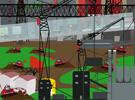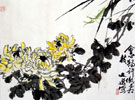Wasn’t your country experiencing economic difficulties?
Everyone is aware of what kind of political environment we have been living in since the 1950s. I am not that well versed in politics, so it is not up to me to say. For decades now the Chinese have been living in poverty and the people are in debt. This is a fact that is recognized by the CCP. The peasants have always depended on nature for survival, and the city inhabitants have never enjoyed the model advantages of communism.
How aware were you of life outside China?
Essentially, life is the same for Chinese people and foreign people. Everyone has to work for a living. It does not matter if you are a Chinese or a foreign beast of burden: you work to earn your keep. There is only one thing that is different—the quality of life.
What motivated your creativity?
Ever since I was a child I have been hard to please; I always want to change things. As a result, my father often beat me. I would snatch a pumpkin from a farmer's field while cutting grass; play hooky to go cricket hunting; manage to escape from work in the porcelain factory; draw in the villages while I was supposed to be working for the construction team… One thing that I can say for sure is that I never thought of myself as having any talent, nor had I ever dreamed of being an artist for the rest of my life.
Since the first time I applied my paintbrush to a large soup bowl, I realized the value of independent work. As a result, I taught myself to paint flowers, birds, fish and insects in traditional Chinese painting style. The purpose of learning to draw landscapes and figures was simple enough—the more I learned, the less possibility the factory leader would take disciplinary action against me. I needed freedom. Singing and playing music were far more important to me.
What did the future hold for you at that point?
On one restless night at the end of 1979, I produced a drawing, titled Looking toward the Future, which magically foretold my future. In the picture there was a young man (my portrait, copied from my image in the mirror, which I drew over and over) standing on top of a mountain in a blue Mao suit, carrying a small drawing kit on his shoulder with his right arm stretching off at an angle (in hindsight, the gesture is reminiscent of Hitler reviewing his troops). Standing aside was a fairy girl in a tight red top and a medium-length blue skirt. Skirt swaying in the wind, the girl held a violin case in her left hand. The couple looked ahead smilingly.
Four years later, the girl materialized right in front of me. After another four years of dating—four years looking into the future together—she became my wife. Looking toward the Future was eight years in the making, while my hand, stretched too far and too high, and pointing to a future too far away, foretold of an entire lifetime of efforts and waiting!
How did politics affect you personally?
From 1978 to 1985, an unprecedented upsurge in painting was seen in the small town of Mi’le. There were more people walking around with palettes on their backs than there were dogs on the street: high school students, workers, farmers, soldiers, etc., were studying painting. It was a new craze around town. Who on earth had spurred this sudden surge in interest and dedicated themselves to teaching the new aficionados? The rehabilitated “rightists” of the government’s “reintegration policy,” among whom figured painters, poets, writers, and photographers, who were not from Mi’le, but were assigned to the Mi’le Cultural Centre. They were the intellectuals and elite of China in the 1950s and 60s. They were bursting with energy after being given a new life and hoped to put their talent to good use. The town must have done something good to have such good luck.
In 1978, I attended a drawing class for half a month, where I met my venerable teacher, Wu Peizhu, who would exert a great influence on my personal development, artistic cultivation, outlook and artworks. However, that drawing class did not fully lead me to the art world, as that aspect of drawing did not interest me.
Why did you change jobs to go and work in construction?
It was not by choice. Things did not always turn out the way I wanted them to. Just when I began to feel like a fish in water at the porcelain factory, it shut down and the workers were reassigned. I was dispatched to the same “construction team” where my father used to work. China was beginning to see small-scale demolition and residential construction, and I became a construction worker overnight, without any psychological preparation or experience.
The death of my father at the age of 42 was a great shock to our family, but the transfer from a satisfying job at the porcelain factory to one as a new worker on a construction team was obviously another. I have always been afraid of heights; as a construction worker, I had to climb up and down every day. When I first started, my body ached all over, not for all the hard work, but because my legs kept shaking out of fear. I did not fear death; I was mentally prepared to fall off the scaffolding or the roof. In fact, I did fall, three times in all, twice from not so high up, and I returned to work after a few days’ rest. The third time I fell from high, but my foreman caught me by the arm and prevented me from falling to the ground. I would often sit on the roof imagining what it would be like if my frail body ever fell off.
Was it manual labor?
Yes. Newcomers in the construction industry started with heavy duty work, such as carrying cement and bricks, or digging. In those days, construction teams in small towns did not have any machinery and relied entirely on manual labor. It was “man over nature” as we used to say. We built brick and concrete structures, but not high-rises. Looking back today, they were not unattractive. By adding some detail, they could be British- or Spanish-style buildings, or maybe even something more interesting.
I had to pass another medical checkup before joining the construction team, which revealed I was 1.68m tall and weighed 43kg—less than the actual bags of cement I was carrying. I had been told that a congenital heart condition reduced my life expectancy, but the company physician said the condition was mild and concluded I was fit for work.
Did anyone ever teach you about building?
One of my father’s old friends had been promoted to senior member of staff. When he saw how slight of build I was, he waited a year before giving me a brick spade and teaching me how to lay bricks. I managed to reach the level of Grade 6 Bricklayer, but I was not happy with my job and wanted a change. I used to dream of becoming an architect, so I taught myself the basics, such as geological surveying, pressure analysis, structural and graphic design, etc. I found it difficult because I am allergic to numbers and figures; they mean nothing to me. Even so, I still dream of being an architect.
When did you look into making art your career?
It was a sudden transition. A trivial incident at the beginning of 1982 completely changed the course of my life. At 7:30 one morning, I was standing in line for some breakfast at the soy milk stall as usual, brick spade and gloves in hand, in my work clothes, covered in dust and ready for work, when I looked up and saw a person carrying a pallet on his back and a copy of How to Paint with Gouache in his hand. Curious and envious, I poked my head over casually to see who it was, only to find it was a classmate of mine from junior high whom I had not seen for years. Surprised, I asked him, “Are you learning to draw too?” He answered, “I was accepted at the Yunnan Arts Institute. I’ve been studying for a year.”
His words were just like a hammer to my head. I was beyond shock. After trying to compose myself, I thought, “I've never seen him draw before. How could he get into the Arts Institute? I have mastered some drawing techniques. Can't I draw as well?” I did not go to work that day, feeling like a hibernating insect woken up by the thunder in the spring. I went directly to my teacher’s home, where I found him enjoying a cup of Chinese liquor.
The first thing I said was: “Teacher, I quit. I don't want to learn architecture. I want to sit the entrance examinations for the Arts Institute. Please teach me. I'll follow you and do anything you want.” Completely taken by surprise by my sudden change of mind, he stared at me for a while, before taking a sip of liquor and mumbling, “he doesn’t want any of it.” All of a sudden, he raised his voice, “Good! You are a man. I'll teach you. Start drawing this today.” He emptied his cup and handed it to me, and continued, “Forget what you've learned up until now. Starting from today, just draw whatever I ask you to.” That day, I started my journey with art.










